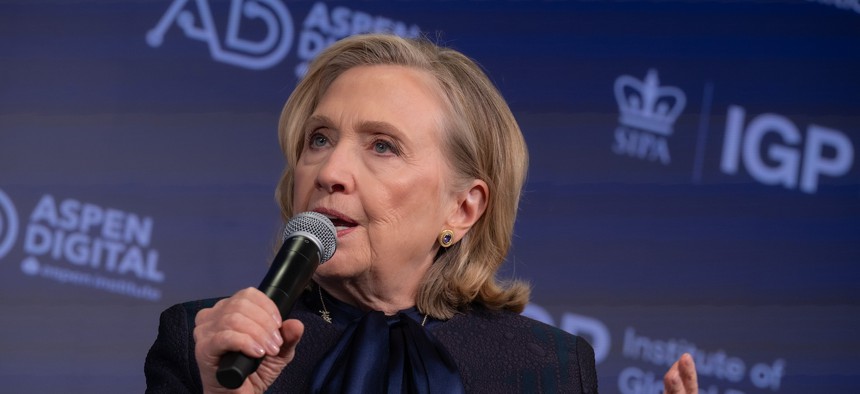Clinton warns of hackers’ ‘leap in technology’ impacting the 2024 election

Former Secretary of State and Democratic Party presidential nominee Hillary Clinton discussed deepfakes and other AI-powered tech that could impact elections at an event in New York City on March 28, 2024. Shahar Azran/Getty Images
Rapid AI-backed advancements have let bad actors craft more sophisticated deepfakes and other sham content that could sway election results, she said.
The rapid advancement of artificial intelligence technologies going into an election year is “more than enough reason” to be worried about how bad actors might affect election outcomes in the U.S. and around the world, according to Former Secretary of State Hillary Clinton.
Clinton, a Democratic presidential nominee who served as the 67th Secretary of State under Barack Obama, told attendees at a joint event on AI and elections with the Aspen Institute and Columbia University’s School of International and Public Affairs that “anybody who’s not worried is not paying attention” and bad actors are planning how to interrupt, interfere with and distort elections, including in November.
She added that Section 230, a legal mechanism that shields tech platforms from liability for third-party content posted on their sites, should be abolished and replaced with a new measure that puts a greater onus on tech platforms to police falsified content.
Clinton recalled a 2011 incident in which Russia President Vladimir Putin publicly accused her of riling up Russian protesters after fraudulent parliamentary elections, spurring online users to craft fake content and spread other conspiracy theories that accelerated into her presidential campaign.
“What they did to me was primitive,” she said, calling deepfakes, where a person’s likeness is superimposed on another individual’s face a “leap in technology” by comparison.
“Having defamatory videos about you is no fun. I can tell you that. But having them in a way that you really can’t make the distinction … [where] you have no idea whether it’s true or not — that is of a totally different level of threat,” Clinton said.
Election interference risks are not as novel as first reported nearly a decade ago, but officials fear that consumer-facing AI tools or similar offerings available on the dark web will supercharge hackers’ attempts to breach election infrastructure or craft realistic-sounding campaigns that would sway voters away from the polls or instill distrust in election outcomes.
U.S. voters got a taste of these capabilities earlier this year when a Texas-linked robocalling operation allegedly disseminated phone calls featuring an AI-generated voice of President Joe Biden in the New Hampshire primary, urging Democrats to “save” their votes for the November ballot.
A pending Supreme Court case would consider whether Biden administration agencies have the ability to stay in contact with social media companies about removing posts that could display disinformation. The case was fueled by allegations that agencies like the Cybersecurity and Infrastructure Security Agency were unfairly pressing for the removal of content related to election results and vaccine safety.



